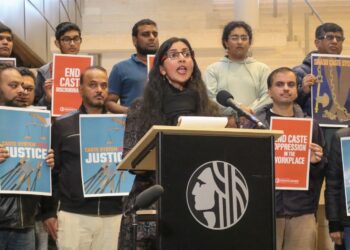UP’s Chief Minister Yogi Adityanath has been accused of perpetrating crimes against humanity between December 2019 and January 2020 in that state in an effort to quell protests against the adoption of the Citizenship Amendment Act (CAA) in India. The action was taken after the World Economic Forum (WEF) invited CM Yogi to attend the WEF conference that would be taking place in Davos, Switzerland, from January 16 to 20.
Guernica 37 Chambers, a specialised group of international criminal and human rights lawyers, filed the complaint with the Office of the Swiss Federal Prosecutor on Tuesday, January 17, in accordance with the notion of universal jurisdiction as stated in Article 264 of the Swiss Criminal Code. The phrase “Genocide and Crimes against Humanity” is covered under Article 264.
Toby Cadman, the co-founder of the Guernica 37 Group and joint head of the G37 Chambers, responded via email to TNM, stating that both the details of the victims, complainants, and petitioners, as well as the criminal report’s contents, are being treated confidentially out of regard for their lives and safety.
According to the press release from Guernica 37 Chambers, “Chief Minister Yogi Adityanath is reported to have ordered the false imprisonment, torture, and murder of civilians between December 2019 and January 2020 in the state of Uttar Pradesh to suppress protests against the adoption of the Citizenship Amendment Act (CAA) in India.”
“As set out in the criminal report, these acts may amount to crimes against humanity as they are alleged to have been committed as part of a widespread or systematic attack against civilians, mostly the Muslim population in the country,” the release said.
There is “sufficient basis,” according to Guernica 37 Chambers, to think that top UP government officials, including Chief Minister Yogi, “are responsible for ordering the UP police under their command.”
As per the statement, “The Chief Minister’s role in the escalation of police violence is particularly apparent in a speech given on December 19, 2019, calling on the police to take ‘revenge’ against protesters. Despite being an Indian State official, the Chief Minister does not enjoy diplomatic immunity for these crimes”.
Following the passing of the Citizenship (Amendment) Act in December 2019, many people, particularly those who belong to the Muslim community, came to the streets to stage non-violent protests. A few of them were attacked by cops after being captured.
According to Guernica 27 Chambers, the criminal complaint claims that Yogi Adityanath, who is the final executive authority over police in Uttar Pradesh, “failed to investigate and prosecute the alleged crimes,” that the UP police “reportedly killed 22 protesters, at least 117 were tortured, and 307 were arbitrarily detained.”
They added that the “escalation of violence and impunity requires urgent actions to hold the perpetrators accountable” and that neither local law, international law, nor the Rome Statute of the International Criminal Court acceded to individual complaints.
According to Guernica 37 Chambers, “the opening of an investigation by the Swiss authorities will serve as official recognition and acknowledgement of the gravity of the alleged crimes and recognition of the status of the victims, that they have thus far failed to receive at the domestic or international levels, and it will further serve as evidence that the culture of impunity will not be tolerated.”
According to Cadman, the complaint has been made under Swiss Criminal Code Article 264a, which deals with crimes against humanity, and the action has been taken “as there have been no meaningful attempts to hold the perpetrators accountable in India.”
The law firm had requested “targeted sanctions” on CM Yogi in a similar submission to the US government last year. Regarding the submission, Cadman stated that the US Treasury had been asked to impose penalties.
He said that a similar request had been made to the UK’s FCDO (Foreign, Commonwealth and Development Office), saying that the procedure “takes some time” and is not made public unless the US government makes the imposition of sanctions public.











